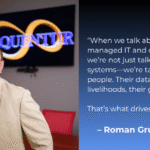Cybersecurity might seem complicated, but at its core, it’s really about one thing: keeping your systems and data safe from people who want to steal or damage them. These real-world examples show exactly what can go wrong when businesses don’t take the right precautions.
1. Colonial Pipeline Hacked Because of One Weak Password (2021)
Hackers shut down a major fuel pipeline in the United States, causing fuel shortages across the East Coast. They gained access through a single account that didn’t have multi-factor authentication.
What this shows: Cybersecurity isn’t just about technology. Employees need to be trained to spot suspicious activity.
2. Equifax Skipped a Software Update and 147 Million People Were Affected (2017)
Equifax failed to fix a known bug in their software. Hackers used it to steal personal data like Social Security numbers from almost half the U.S. population.
What this shows: Keeping your software updated is one of the easiest and most important ways to stay protected.
3. MGM Resorts Was Tricked by a Phone Call (2023)
Hackers called the company’s help desk, pretended to be an employee, and gained access to internal systems. The incident ended up costing the company over $100 million.
What this shows: Cybersecurity isn’t just about technology. Employees need to be trained to spot suspicious activity.
4. Target Was Hacked Through Their Air Conditioning Vendor (2013)
Attackers broke into Target’s systems by first gaining access through a third-party HVAC contractor. From there, they stole payment data for over 40 million customers.
What this shows: Vendors and outside partners need limited and closely monitored access.
5. Uber Breached After an Employee Approved a Suspicious Login (2022)
A hacker kept sending login requests to an employee until they gave up and clicked “approve.” That gave the attacker access to Uber’s internal systems.
What this shows: Even security tools like multi-factor authentication can fail if people don’t know how to use them properly.
How to Protect Your Business
Here’s what every business should be doing to stay safe:
- Update all software and systems regularly
- Use strong, unique passwords and multi-factor authentication
- Train your staff to recognize phishing and scams
- Limit vendor access to only what they need
- Have a plan in place for what to do if something goes wrong
Cybersecurity doesn’t have to be overwhelming. A few smart steps can help prevent big problems—and protect your business from serious harm.
Where Sequentur Fits In
At Sequentur, we’re in the business of helping companies avoid stories like the ones above. Whether it’s improving security, tightening up vendor access, or training your people, we work alongside you to keep things simple, strong, and secure.
No scare tactics. No tech jargon. Just solid, practical support.
If you ever want to talk through your IT security—or see where there might be gaps—I’m happy to chat.
















